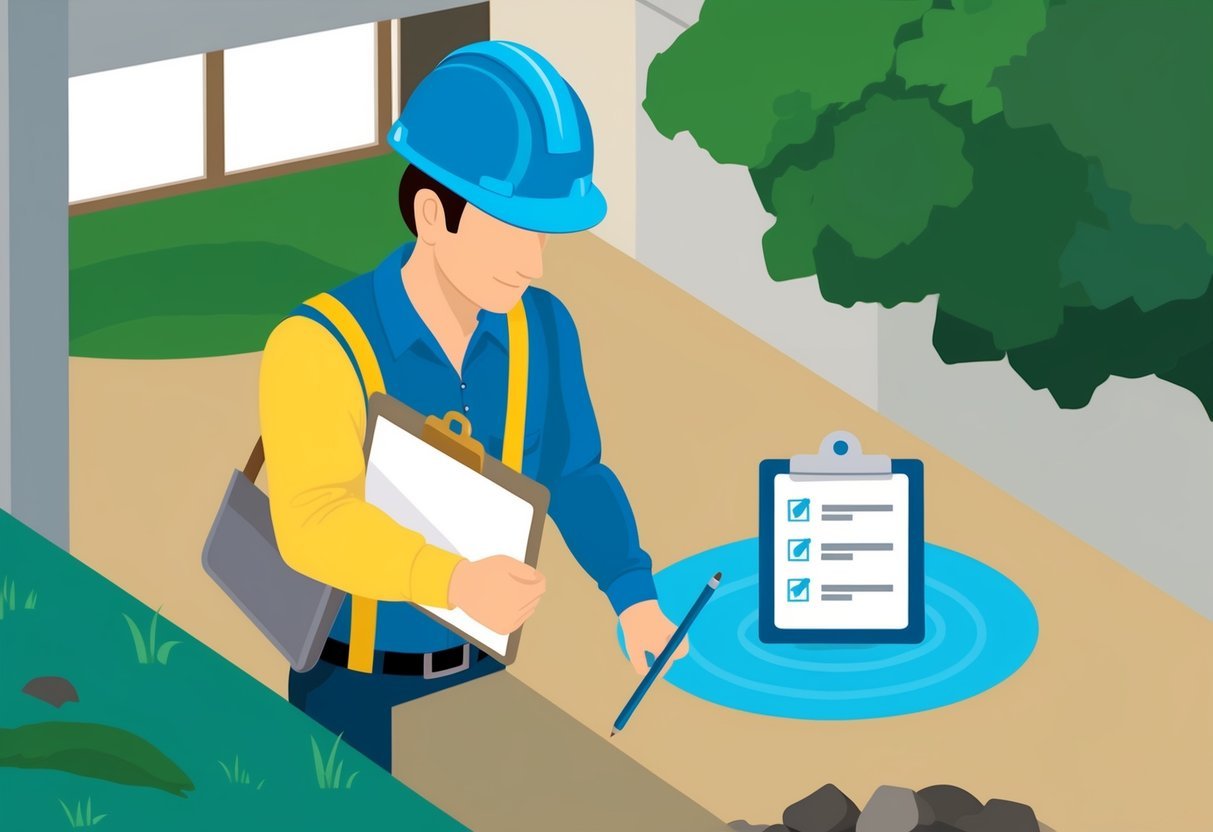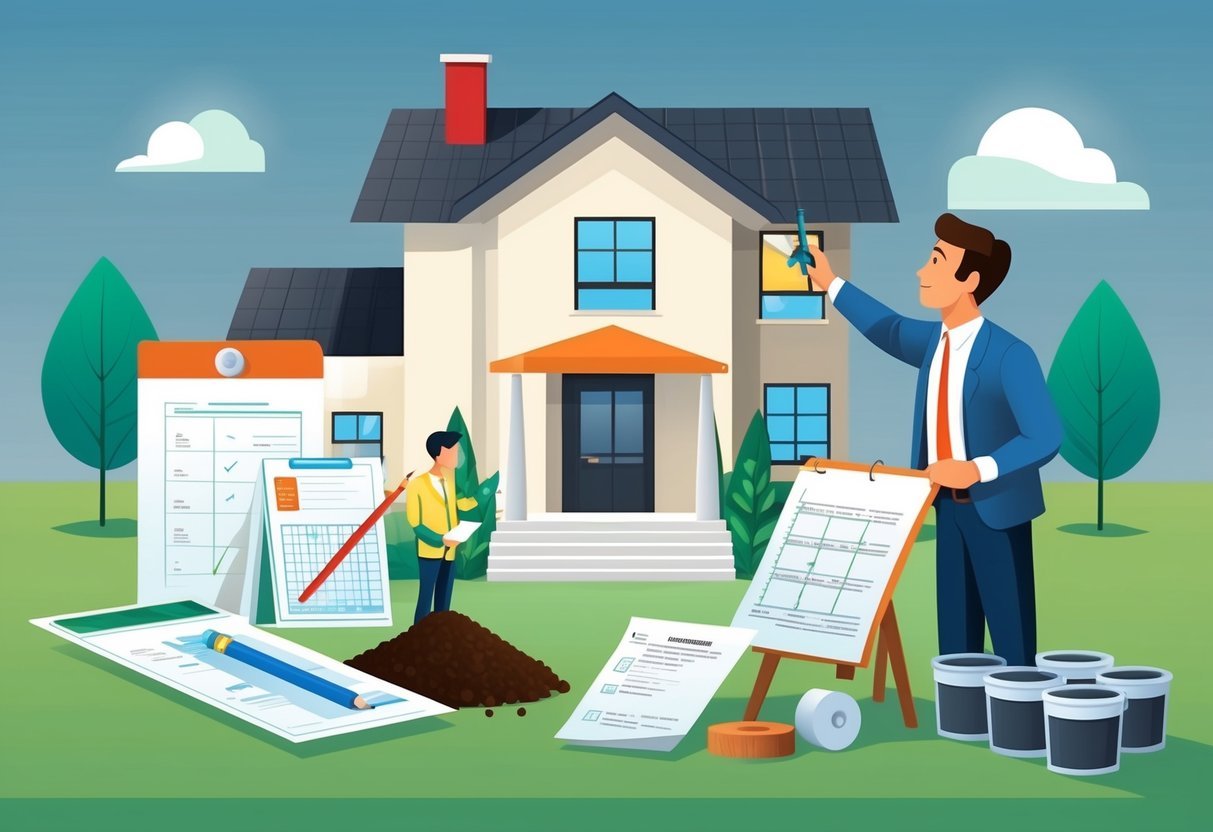In the ever-evolving world of real estate, anyone looking to invest in property must conduct thorough due diligence.
It serves as a crucial process that allows us to assess the potential risks and benefits associated with a real estate investment. Understanding how to perform due diligence effectively can be the key to a successful property acquisition.

Navigating through various aspects of a property, such as its financials, market conditions, and physical condition, helps us make informed decisions.
This process not only aids in mitigating potential risks but also provides a clearer picture of what we are committing to, ensuring that our investment stands on solid ground.
1) Review Legal Documents
When conducting due diligence on a property, you must carefully examine all legal documents.
First, we obtain copies of the title records to confirm property ownership and identify any encumbrances or liens.
These records provide critical information about easements that might impact our use of the property.
Next, we analyze any existing contracts or agreements related to the property.
This includes lease agreements, service contracts, and any other ongoing obligations that we might inherit.
By understanding these documents, we can anticipate any potential legal responsibilities or conflicts.
It’s crucial to review zoning regulations and land use restrictions.
We verify that the property’s current and intended use comply with local zoning laws.
This check helps prevent future legal disputes and ensures our investment aligns with our strategic goals.
Our team also examines building permits and inspection reports.
These documents reveal any renovations or modifications made to the property, ensuring they’re compliant with local building codes and standards.
We aim to identify unapproved work that might pose future risks.
Engaging a real estate solicitor is an integral part of our process.
Their expertise assists us in interpreting complex legal language and identifying potential red flags.
This step plays a vital role in safeguarding our interests and ensuring a smooth transaction.
Finally, checking for any ongoing litigation or legal disputes involving the property is paramount.
We want to ensure there are no hidden surprises that could affect property value or usability after acquisition.
Our thorough review of these legal documents minimizes risks and strengthens our investment decision.
2) Conduct Title Search

In the process of due diligence, conducting a title search is crucial.
It allows us to verify the legal ownership of the property and uncover any claims or liens that could affect the transaction.
This step ensures we are aware of any legal issues tied to the property.
The search involves examining public records to confirm the seller’s right to sell and identify any restrictions, easements, or other encumbrances.
Properly reviewing these records helps us avoid potential disputes and financial losses down the road.
Hiring a professional title search company or real estate attorney can be invaluable.
Their expertise ensures accurate and thorough examination of property records, which is essential for avoiding future complications.
We may encounter discrepancies like unpaid taxes, liens, or claims from previous owners.
Addressing these before finalizing the deal will help us mitigate risks.
Understanding the intricacies of the title ensures a smoother transaction and protects our investment.
By conducting a detailed title search, we gain clarity on the property’s history and legal standing.
This step helps us make informed decisions and proceed confidently with the purchase or sale.
3) Check Zoning Regulations
When conducting due diligence, checking zoning regulations is essential.
These laws govern how a property can be used, influencing its value and potential.
By understanding local zoning, we can ensure the intended use aligns with community standards and legal requirements.
We start by reviewing the zoning classification of the property.
This classification indicates whether the property is designated for residential, commercial, industrial, or mixed-use.
Knowing the specific zoning code helps us identify potential restrictions or allowances that impact future development.
Additionally, we must verify if there have been any recent zoning changes.
Amendments can alter what is permissible on the site.
Staying informed about these changes helps us avoid unexpected legal issues and adapt our plans accordingly.
It’s crucial to examine any additional zoning overlays.
These could include historic preservation areas or environmental protection zones.
These overlays may impose further limitations or offer unique opportunities, requiring thorough examination to leverage or mitigate their effects.
We should also consider seeking a zoning compliance letter.
This document provides written confirmation that the current use of the property complies with local laws.
It serves as an essential record for our transactions, offering peace of mind to buyers and sellers alike.
Collaborating with local zoning authorities or consultants can provide insights into future zoning plans or expected developments in the area.
This knowledge can significantly affect property desirability and investment decisions.
4) Inspect Property Condition

Inspecting the property condition is a fundamental step in due diligence.
As part of this process, we conduct a thorough inspection to uncover any maintenance issues or structural concerns.
This helps us understand the current state of the property and anticipate any future repairs or upgrades that might be necessary.
We pay close attention to the structural integrity of the building.
This involves checking the foundation, walls, and roof for any signs of damage or wear.
It’s crucial to identify issues early, as neglecting structural problems can lead to costly repairs in the future.
We also evaluate the condition of major systems such as plumbing, electrical, and HVAC.
Ensuring these systems are in good working order is essential for both safety and comfort.
Regular maintenance histories and any recently completed work should be reviewed carefully.
Furthermore, we examine the exterior features including parking areas, landscaping, and any outdoor amenities.
This provides us with an idea of the overall appeal and functionality of the property.
Attention to detail here can reveal additional hidden costs or areas for improvement.
Engaging a professional inspector is often necessary, as they bring expertise that may not be within our team.
Their detailed reports offer valuable insights and form an important part of our decision-making process.
Overall, these inspections are invaluable for making informed investment decisions.
5) Analyze Market Value

When conducting due diligence, understanding the market value of a property is key.
We must examine comparable sales in the area, often referred to as “comps,” to gauge the appropriate market price.
This involves looking into recent sales data of similar properties to determine if the asking price aligns with current market trends.
Considering market trends is crucial.
We should assess whether the property is located in a neighborhood experiencing growth or decline.
Additionally, analyzing local economic indicators can help us predict future property value changes.
Aspects such as new business developments or planned infrastructure improvements may influence market appreciation.
We need to factor in unique attributes of the property that might affect its value.
Features such as a newly renovated kitchen, a large yard, or a central location can command a premium price.
Conversely, any unique drawbacks could warrant a discount.
Another important step is evaluating the property’s potential rental income.
This involves researching current rental rates in the area and comparing them to the property in question.
Consider how these rates align with our investment goals as well.
It’s beneficial to use professional appraisal services to get an expert opinion on market value.
This ensures we are making a well-informed decision based on comprehensive insights.
Appraisers examine various factors and offer a detailed valuation report.
Engaging a real estate agent with local expertise might provide additional valuable insights into market value.
Agents often have access to fresh market data and trends, helping us pinpoint an accurate valuation.
6) Verify Land Survey

When conducting due diligence on a property, confirming the accuracy of the land survey is crucial.
A proper survey delineates the boundaries and helps identify any potential encroachments.
This ensures that what we think we’re buying aligns with the legal property description.
We must contact a licensed surveyor to examine the existing survey documents.
They check the survey’s correspondence with the recorded plat map and ensure there are no overlaps with neighboring properties.
Reviewing the survey assists us in understanding easements, rights of way, and other restrictions that might affect the property.
These details are critical, particularly when planning modifications or constructions on the land.
A detailed survey can reveal issues such as zoning violations or disputes over boundary lines.
Addressing these before purchase minimizes future conflicts.
If discrepancies arise, it might be wise to negotiate adjustments or corrections with the seller before finalizing the transaction.
Acquiring a recent survey, especially in developed areas, is a vital step.
If significant changes have occurred to the landscape or surroundings, a new survey may be necessary to capture these updates accurately.
Properly verifying the land survey reduces risks and ensures a smooth transaction process.
It mitigates legal issues and potential surprises after we close the deal.
Checking these details reinforces our investment’s integrity.
7) Evaluate Environmental Risks

When conducting due diligence on a property, assessing environmental risks is essential.
We start by reviewing any past environmental site assessments the property might have.
These assessments provide insights into existing or potential environmental liabilities.
Site visits are important to identify visible issues that may include soil contamination, hazardous waste, or improper handling of chemicals.
Observing the surrounding area helps us understand potential off-site impacts that might affect the property.
We also need to examine historical property records.
Looking at past uses of the property can reveal risks such as old storage tanks, industrial use, or previous contamination incidents that might still have an impact.
Consulting with environmental professionals offers a more in-depth analysis.
Specialists can perform soil and groundwater testing to uncover hidden issues, ensuring that we identify all potential threats.
We shouldn’t overlook compliance with local, state, and federal environmental laws and regulations.
This step helps in determining whether the property meets all legal requirements, thereby avoiding future legal troubles.
Analyzing environmental permits is likewise important.
Current or expired permits can signal past compliance issues or ongoing requirements that must be addressed before acquisition.
Thorough due diligence in evaluating environmental risks equips us with critical information.
This enables informed decision-making, minimizing potential liabilities and helping us maintain the property’s value and integrity.
8) Assess Structural Integrity

When evaluating a property, understanding the structural integrity is crucial.
We begin by examining the building’s foundation for signs of cracks or settling.
These might indicate underlying problems.
It’s important to look for uneven floors or walls, as these can signal potential structural issues.
Inspecting the roof is another key area.
We check for any signs of damage such as missing shingles or leaks, which can lead to costly repairs if not addressed early.
Roof integrity plays a significant role in the overall health of a building.
We also focus on the load-bearing walls, columns, and beams.
Visible cracks or unusual angles may suggest compromising issues.
Structural components must not only support the building’s weight but also withstand environmental pressures like wind or seismic activity.
Windows and doors serve as indicators of structural soundness.
If they do not open or close smoothly, it could suggest warping or shifting in the building’s frame.
Proper alignment is essential for long-term stability.
The building systems, including plumbing and electrical installations, can affect the structure if poorly maintained.
Water damage from leaks, for example, may weaken walls or foundations.
We scrutinize these systems to ensure they do not pose risks to structural integrity.
Throughout our assessment, we rely on professional inspectors or consultants.
Their expertise provides us with a thorough evaluation, ensuring we do not miss any critical structural concerns that might otherwise go unnoticed.
Engaging professionals adds confidence in our assessment.
Understanding Property Due Diligence

Property due diligence is a crucial process that helps us navigate the complexities of real estate transactions.
By focusing on its definition, importance, and key objectives, we equip ourselves with the knowledge to mitigate risks and make informed investment decisions.
Definition and Importance
Due diligence in property transactions involves thoroughly examining a property’s legal, financial, and physical aspects before purchasing.
This process ensures we have a clear understanding of what we’re buying, avoiding unforeseen liabilities.
It’s critical for verifying the accuracy of the claims made by sellers, ensuring there are no hidden costs or issues that could complicate ownership.
Thorough due diligence also affects negotiations, allowing us to adjust terms or pricing based on newfound information.
Emphasizing its importance, due diligence fosters confidence and security in our investment choices.
Knowing the property’s true value and potential also informs our decision-making, allowing us to proceed with adequate knowledge and preparation.
Key Objectives
Three critical objectives guide our due diligence efforts: risk mitigation, verification, and informed decision-making.
Risk mitigation involves identifying and addressing potential issues like environmental hazards or legal disputes that could affect property value.
Verification includes confirming the accuracy of the information provided by the seller.
This could involve reviewing financial statements and property documentation to prevent discrepancies.
We must ensure every aspect of the property aligns with what’s promised.
Informed decision-making is the end goal, ensuring we make the best choices based on complete and verified data.
Each objective seamlessly integrates to secure our investment, protect interests, and flawlessly execute property transactions.
Legal Considerations

When conducting due diligence in real estate, addressing legal matters is crucial.
This involves ensuring property ownership is clear and that intended property use complies with local regulations.
Title Search
A comprehensive title search verifies current ownership and uncovers any legal claims against the property.
We examine historical property records to check for liens, encumbrances, or disputes.
These can affect ownership rights and delay or complicate transactions.
Engaging a qualified title examiner or attorney enhances accuracy in this process.
Title insurance is another fundamental aspect worth considering.
It protects us and our investments against unforeseen claims.
This insurance safeguards against previous owners’ claims, fraud, or undisclosed heirs.
Although this is often overlooked, ensuring title clarity can prevent future legal disputes and financial burdens.
Zoning and Land Use
Understanding zoning and land use regulations is pivotal in due diligence.
Zoning laws dictate how properties can be used, impacting potential development or renovation plans.
We research the property’s zoning classification via local government resources, identifying any restrictions or special conditions.
Zoning compliance ensures that our intended property use aligns with regulations.
We seek variances or conditional-use permits if current zoning doesn’t suit our plans.
Consulting with a zoning attorney or urban planner can provide a deeper insight, helping mitigate risks associated with non-compliance.
Zoning assessments aid in making informed decisions, preventing legal entanglements and potential project interruptions.
Financial Evaluation
Conducting a financial evaluation involves understanding both the market value of the property and the ongoing costs associated with ownership.
This analysis is essential for predicting long-term investment performance and financial responsibilities.
Market Value Assessment
Determining a property’s market value is crucial for making informed investment decisions.
We begin by analyzing recent sales of comparable properties in the area, often referred to as comparables or “comps.” This helps establish a baseline for the property’s fair market price.
Additionally, we consider factors such as location advantages, neighborhood growth trends, and unique property features.
This comprehensive assessment gives us a clearer picture of how much the property is worth in the current market climate, aiding in negotiation and purchase decisions.
Whether using professional appraisals or market analysis tools, understanding market value is key to avoiding overpayment.
Cost of Ownership
Ownership comes with various costs that extend beyond the initial purchase price.
It is vital for us to calculate these ongoing expenses to fully grasp the investment’s financial implications.
Common costs include property taxes, insurance, and regular maintenance.
Larger properties may also incur fees for management services or homeowner associations.
By laying out these expenses in a budget, we can evaluate the property’s affordability and potential return on investment.
It’s also prudent to factor in unexpected costs such as major repairs or assessments.
Understanding total ownership costs allows us to make sound financial decisions and plan adequately for the future.
Frequently Asked Questions
As we conduct due diligence on a property, it’s crucial to review legal documents, analyze market value, and thoroughly evaluate both residential and commercial properties.
We address common queries to demystify the due diligence process.
What documents are included in a comprehensive real estate due diligence checklist?
Our checklist typically comprises legal documents, title reports, zoning regulations, and property inspection reports.
These ensure that we assess all aspects accurately and facilitate informed decision-making.
How can a buyer effectively evaluate a property through due diligence?
Evaluating a property involves conducting thorough inspections, reviewing financial records, and examining the property’s legal status.
By cross-referencing data, we can identify discrepancies and verify the property’s authenticity.
What are the critical legal considerations during the property due diligence process?
Legal considerations include verifying title ownership, ensuring compliance with local zoning laws, and identifying any existing liens or easements.
This helps us avoid potential legal disputes or violations.
How does the due diligence process differ between residential and commercial properties?
While the basic principles remain the same, residential properties often focus more on personal use suitability and livability.
In contrast, commercial properties require a detailed analysis of potential revenue generation and compliance with business-related regulations.
What are the environmental assessments necessary for property due diligence?
For effective due diligence, we perform environmental assessments to identify any contamination issues, including soil and water testing.
This helps us mitigate future liability and ensure a safe investment.
Which financial analyses are crucial for conducting due diligence on a potential real estate investment?
Financial assessments involve evaluating current and potential income streams, expenses, and tax obligations.
These analyses enable us to understand the return on investment and financial viability of the property.

